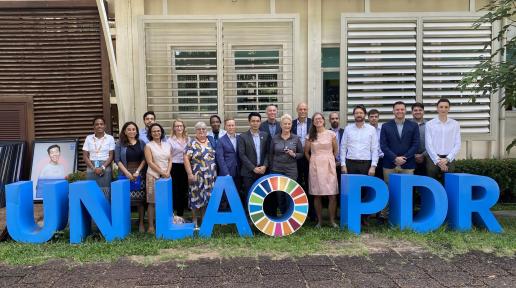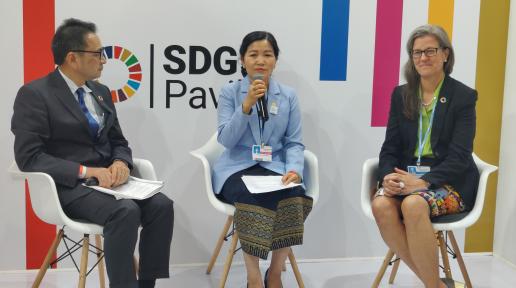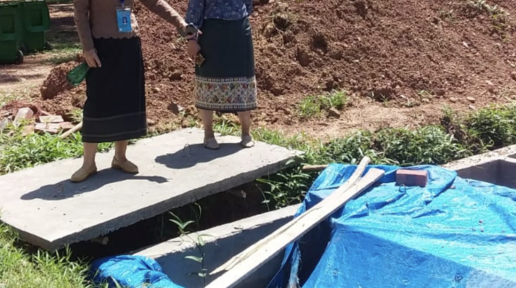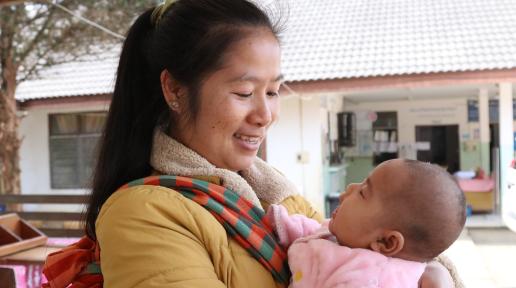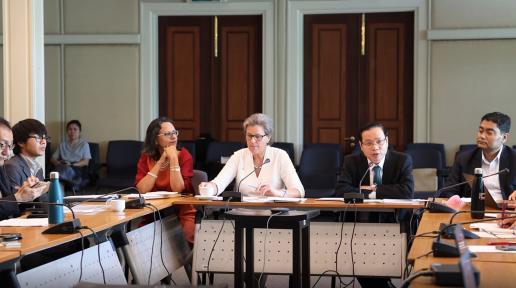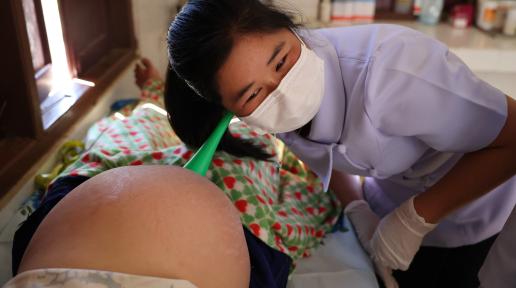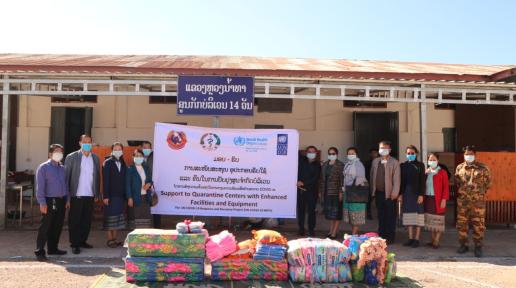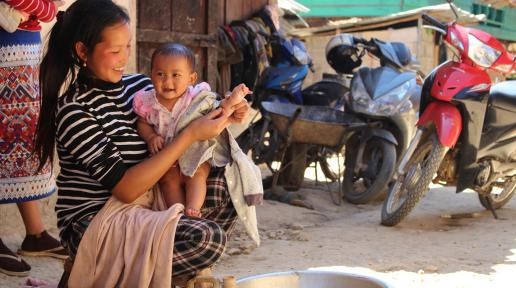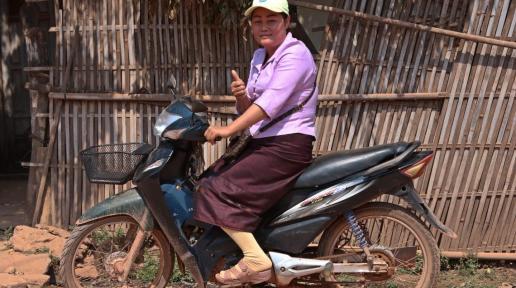ເລື່ອງ
07 ຕຸລາ 2024
Strokes Of Hope
But it wasn’t seen as a profitable profession in Laos. At least the earnings will never be enough to make ends meet. My parents were supportive, as long as I kept it as a hobby.About five years ago, a colleague told me that there was a young artist he planned to meet on his trip to Pakse (Champasak) who has done beautiful work. His name was Seevanh Sibounhueang (Vanh).I got very curious. Questions jumped around in my head: is he someone who is well off? How is it possible to have art as a profession in this market? All these thoughts kept spinning around in my head, as I recalled that I had to give up my passion of painting and find other passions to build a career of. So I was stunned to know that finding art was this young man’s map to finding a new life. Immediately, I searched for his name and have followed him on Facebook ever since.A couple of weeks ago, as my team was searching for creative ways to display the Sustainable Development Goal (SDGs) in our office building, we reached out to big names and famous artists in town. We needed something to be done urgently. I almost gave up. Luckily, as I was scrolling through my Facebook feed for more options, I came across Vanh’s recent artwork and immediately called him. Vanh who is 28 years old now, was born in Vientiane Capital before moving to Pakse to live with his wife and family. The third child in a family of eight, his life changed forever when he was a teenager. On one rainy evening, his father asked for his help to move a piece of metal above the roof. Unfortunately, while transporting the metal, the other end touched a run-down wire which badly electrocuted him. Vanh could have lost his life. It took him weeks before he could walk but the news that devastated him the most was that he would lose both his arms. He wasn’t ready. But there was no other choice as the tissues surrounding his arm had died. His parents took the decision to amputate his arms before it was too late.Suicide crossed his mind several times as he kept dwelling in the injustice he faced- from having had a full- functioning body, to eventually losing his arms over that accident. He was afraid and embarrassed to even get out of his house, “I wasn’t born with a disability, and I was scared to be seen. Will those eyes judge me? Will they look down on me? It was all in my head that the community wouldn’t accept me.”.“Despair. That’s all I can say about how I felt. But if I did end my life, if I felt I was a burden- my parents could have let me die that night. They didn’t have to save me,” shared Vanh. After months of trying to accept his reality, Vanh told himself that he should not stay sad forever, at least as a way to show his gratitude to his loved ones. Boredom soon took over as he stayed home all day, and Vanh started looking at art tutorials by Thai teachers on YouTube. Similar to Lao language, it was quite easy for him to understand Thai and learn. Soon, Vanh started picking up skills. Vanh had minimal equipment and began sketching. He used his foot in his first attempt to write and it wasn’t easy. After a while, he made his first stroke with a paint brush. Vanh practiced frequently and it got a bit simpler to control. Then, he tried to use the brush with his mouth. But this was very inconvenient as he found it difficult to see how accurate his movements were, as his head moved with each motion. At one point, Vanh got so annoyed that he searched around his home and asked his younger brother to get the rubber from their motorcycle tyres to make a wrap around his arm to which his brush could be attached. At least, this way it would be durable. After a lot of practice, he achieved precision and was able to wear the rubber set by himself. “I wanted to be a car mechanic. At least that was what I thought was my ambition before that night. But now that I am here looking back- wanting to be an artist was always in me,” Vanh said, smiling. He reminisced of how he would love to sketch pictures of cars and would have done anything to decorate cars. Vanh said since he didn’t have a car- why not just draw one instead?So how did he get on social media? Apparently, there was one programme to support business thinking and design supported by Maybank for persons with disabilities in Malaysia, back when he was getting back on his feet. Vanh was opened to tools and social media marketing which he tried to access as soon as he got back to Laos.Vanh attempted to add as many people as possible on his own Facebook account, by the name of Vanh likes drawing. He began with realistic art such as portraits and not long after, he received his first customer. A policewoman who saw how realistic his artwork was, approached Vanh to make a portrait of her. That was like a fire that sparked his soul. He didn’t know how to accept her payment and he thought 100,000 (LAK) (about US$) was too expensive with his lack of experience. But she liked it so much that she paid more, so Vanh could buy more equipment to continue his work. For the first time, he felt hope again. Vanh sought options for how he can look for marketable art and he saw that in neighboring countries, there are customizable shoes, bags and t-shirts using acrylic paint, which he adores. He also really wanted to buy canvases and paint but did not have enough to purchase any.Soon, he resorted to stealing his little sister’s shoes and painted on them. He hid them from her, unsure if she would be angry for what he did. But thankfully, she liked it. And that, turned into his new product line. He continued to find new customers, showcased his work online to invite more people to his Facebook page. When I showed Vanh’s artwork to our team- they immediately said yes to having him work with us. We wanted to localize and come up with an SDG installation, with a Lao look and feel. We decided to go with the “Pha Khao”- a Lao-style seated round bamboo table on which each SDG would be painted. Vanh also liked the idea and got straight into work. Indeed, Vanh did not fail to produce another masterpiece. He was also inspired to use local products for his future work. He expressed his heartfelt appreciation to us for trusting him with this task. In the coming weeks, Vanh will be working to complete his first gallery and wishes to also ask for donations of used items like the Pha Khao and other locally- available items so he can upcycle them to showcase there.The gallery is a result of support from his friend who is also a person with disability and an art collector. After the official launch, Vanh wishes to send part of his revenue as his contribution to support the community of persons with disabilities. “I was very poor. I was lost, not knowing what to do or where to go. But with the support from our community, I have got to where I am today,” Vanh further added, “I want to make sure that I can give back as much as I can, so we can all have an easier tomorrow”. And that was our very first in-person encounter with Vanh, the artist who paints hope with every stroke of his brush, especially in our hearts.The blog is written by Aksonethip Somvorachit, Associate Development Coordination Officer, Communications and Advocacy, UN Resident Coordinator's Office, Lao PDR.

